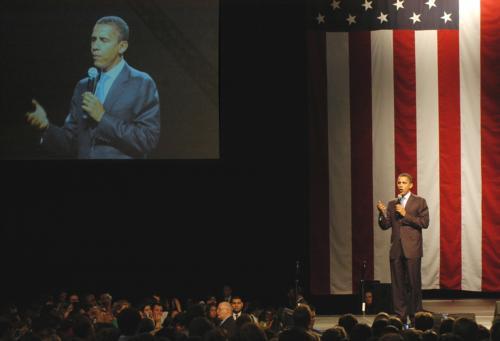
News
Summers Will Not Finish Semester of Teaching as Harvard Investigates Epstein Ties

News
Harvard College Students Report Favoring Divestment from Israel in HUA Survey

News
‘He Should Resign’: Harvard Undergrads Take Hard Line Against Summers Over Epstein Scandal

News
Harvard To Launch New Investigation Into Epstein’s Ties to Summers, Other University Affiliates

News
Harvard Students To Vote on Divestment From Israel in Inaugural HUA Election Survey
Obama Event Targets Students
Over 175 Harvard Dems attend largest fundraiser yet for 2008 contender

Over 5,500 people packed into the Agganis Arena at Boston University last Friday in what Senator Barack Obama, an Illinois Democrat and 1991 graduate of Harvard Law School, called the “largest fundraiser we’ve had.”
The sold-out fundraiser marked Obama’s first public appearance in Boston since he declared his candidacy for president in February, and comes just a month after he held a fundraising event at the Cambridge home of Kirkland and Ellis Professor of Law David B. Wilkins ’77.
But unlike last month’s event—which hosted about 150 of Obama’s former Law School professors, classmates, and friends, and cost $2,300 to attend—Friday’s fundraiser was primarily aimed at attracting college students and mobilizing a grassroots campaign.
Students were able to purchase tickets for the senator’s New England kickoff for just $23, though participants could contribute as much as $2300. Members of Obama’s campaign stood at the entrances with sign-up sheets encouraging students to volunteer in New Hampshire.
More than 175 students from Harvard attended, according to Nathaniel J. Lubin ’09, a coordinator of Harvard Students for Barack Obama. But the event also drew large crowds from Boston University, Boston College, Northeastern University, and Tufts University.
The fundraiser produced one of the largest student turnouts in Obama’s campaign so far, according to Reid H. Cherlin, press secretary for Obama’s New Hampshire campaign.
Gazing into the sea of college students—some wearing “Obama” t-shirts or holding up “Obama ’08” signs—the senator called on students to join his campaign.
“I can’t do it by myself,” Obama said to the cheering crowd. “There are going to be times when I make mistakes, but if this campaign becomes a vehicle for your hopes and dreams, then it cannot be stopped.”
The senator added that with their help, he would be able to change the direction that America is moving, mentioning the war in Iraq and universal health care as his top priorities.
“At every juncture in American history, change has happened because of you,” he said. “And today is no different.”
Obama pointed out that he is one of the few senators who opposed the war in Iraq, and he said that, if elected, he would gradually withdraw American troops from combat zones. By the end of his first term in office, Obama promised that all Americans would have universal health care.
The audience gave Obama a standing ovation when he mentioned Darfur, saying that he would “end the genocide” with international help.
“Too much is at stake, Boston, to not overcome the cynicism of today,” Obama said.
After the speech, the arena buzzed with excitement, and a throng of people gathered in front of the stage to try to take the senator’s picture or to shake his hand.
“He really does speak to the people in a way that we haven’t heard before,” Lubin said. “He gives us hope.”
The fundraiser was as much about mobilizing the grassroots effort as it was about generating money, according to Cherlin.
“So many people are energized that we wanted to bring them all together to see Senator Obama up close,” he said. “This is not a traditional fundraising event.”
Cherlin said the young crowd represents Obama’s energizing effect on politics.
“A lot of people who have never been involved in politics want to be involved,” he said.
—Staff writer Kevin Zhou can be reached at kzhou@fas.harvard.edu.
Want to keep up with breaking news? Subscribe to our email newsletter.
